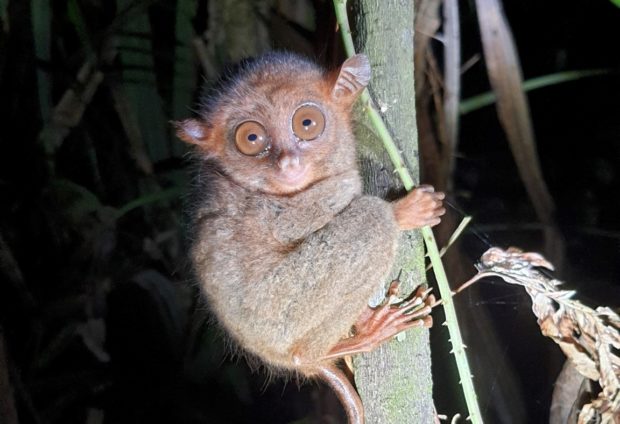PH tarsier spotted in Tacloban for 1st time

Tarsiers, locally known as “mago”, were discovered in a forest in Tacloban City.
(Photo by Richard B. Parilla)
TACLOBAN CITY—The Division of Natural Sciences and Mathematics (DNSM) of the University of the Philippines Visayas Tacloban College (UPVTC) has confirmed the presence of the Philippine tarsier in the forests of this city.
In a social media post on Thursday, August 10, the research team said tarsiers, locally known as “mago,” were discovered in a forest in Barangay Santa Elena.
“The presence of the Philippine tarsier in Tacloban City’s forests highlights the role of the city as a key biodiversity area,” the UPVTC-DNSM said in a statement.
Tarsiers (Tarsius Syrichta) measures 4 to 5 inches and is considered the world’s smallest primate. Its size is no longer than an adult man’s hand and weighs only 113 to 142 grams or four to five ounces.
The UPVTC-DNSM conducted night surveys on the reported presence of the nocturnal animals on July 29 to 31.
The survey is part of an ongoing research project on Philippine tarsiers in the city, the group said.
The Philippine tarsier is found only on the islands of Mindanao, Bohol, Samar, and Leyte.
It was learned that the scant literature on the Leyte tarsier and anecdotal reports of sightings of the species, particularly in the neighboring municipalities of Tacloban, was the reason cited by the researchers in conducting the tarsier population study in the forests of this city.
The researchers, however, did not indicate how many tarsiers they discovered during their study in the forests of Sta. Elena.
The Inquirer reached out to the group but did not get any response as of 4 p.m. on Thursday.
Before the survey, the researchers secured a prior informed consent (PIC) from the Tacloban City Environment Office and concerned local barangays, as well as a Gratuitous Permit (GP) from the regional office of the Department of Environment and Natural Resources.
“The presence of tarsiers and other endemic species should be taken into account in the city’s land-use plans, particularly in terms of protecting the areas where the tarsiers live,” the researchers said.
RELATED STORIES
Surprise: Tarsiers found outside Bohol